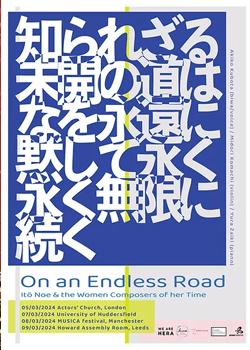On an Endless Road: Ito Noe and the Women Composers of her Time

By composer Francesca Le Lohé
With Kubota Akiko (biwa), Komachi Midori (violin) and Zaiki Yura (piano)
Actor’s Church, London (5 March)
Review by Cameron Bassindale
On 5 March, London was treated to a Japanese classical music performance of the highest calibre. On an Endless Road: Itō Noe and the Women Composers of her Time is an exploration of the female composers active in Japan during the life of Ito Noe, a feminist figure of the Meiji era (1868-1912) whose story remains to this day criminally under told. Composer Francesca Le Lohé, with the support of The Japan Foundation and The Daiwa Anglo-Japanese Foundation, have gone a considerable way to address this, telling a story through various means which certainly left an impression.
Inside the gorgeous Actor’s Church, Covent Garden, violinist Komachi Midori and pianist Zaiki Yura begun proceedings with a sonata from Koda Nobu. With a light, joyful depth it was not what I expected; it sounded every bit as European as a Schubert or Faulk. From the start it was clear that the night’s performances were going to confound any preconception I might have had about Japanese classical music of the Meiji era. Komachi and Zaiki dovetailed with each other masterfully, in full command of the audience which was some way larger than I had expected. The sonata flowed into itself, coming to a considered and atmospheric finale.
After the performance, Komachi was joined on stage by Irena Hayter, a professor at the University of Leeds, and composer Francesca Le Lohé for a Q&A session about the life and times of Koda. After a musical education in Europe, Koda returned to Japan to debut a great number of European works, bringing them for the first time to a Japanese audience. However, as our panel told us, Koda was the victim of the sexist Meiji period, and despite playing and composing evidently fantastic music was summarily kicked out of her school at The Tokyo University of the Arts and victim of ridicule in the press.
The second performance, a composition by Toyama Michiko, introduced for the first time the distinct and recognisable overtures of classical Japanese music. A sharp, shrieking violin really engendered the feeling of drama and theatre. Despite being composed 50 years after Koda Nobu’s sonata, it sounded at least 200 years older.
After a brief intermission, our panel from the first Q&A was joined by Kubota Akiko, to give us more context on Ito Noe, and why her story matters. What was striking was the sheer adversity faced by Ito in her lifetime, and the disparagement she suffered from the ruling class for the crime of believing that woman and men are equal and deserve an equal opportunity at education. The Meiji-era police state which governed tightly the morality of the time sent officers frequently to tail Ito, whose outspoken criticism of the patriarchy she found herself in was enough to ruffle more than a few feathers.
Unperturbed by this spying on her, says Irena Hayter, Ito once turned to the secret police tailing her and asked him if he could make use of himself and carry the diapers for her children. Sadly, our panel explains, in the aftermath and confusion of the 1923 earthquake the state seized the opportunity and killed Ito and her her lover, anarchist author Osugi Sakae, whilst the dust settled on Tokyo. This visceral story, of which only a fraction is reproduced here, set the scene for Kubota Akiko’s biwa performance.
With a screen displaying surtitles, Kubota’s vocal performance was immediately arresting. Her undulating tones set with the biwa’s brash melody were the perfect accompaniment for the story being told. The refrain, “For the new woman, there is a new woman’s way” peppered throughout underlined the radically contemporary take on a story a hundred years old, and an art form far older. As Kubota explained before the performance, the biwa was always traditionally a male artform, telling the story of samurai and valour, so even the act of taking this medium and using it to tell the story of one of Japan’s most forward-thinking radical felt in many ways counter-cultural.
The performance winds through the life and times of Ito, exalting her outspoken radicalism with what was clearly a world-class performance from Kubota. As it came to end, and the audience filtered out into a brisk London evening, I couldn’t help but feel that the cultural landscape in the UK was being enriched if only a little by On an Endless Road: Itō Noe and the Women Composers of her Time.

